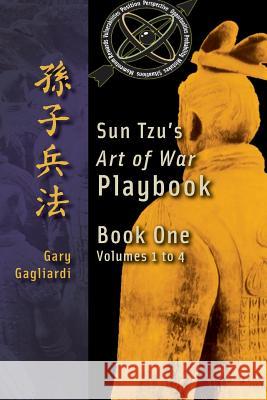Book One: Sun Tzu's Art of War Playbook: Volumes 1-4 » książka
Book One: Sun Tzu's Art of War Playbook: Volumes 1-4
ISBN-13: 9781929194858 / Angielski / Miękka / 2014 / 618 str.
This is Book One of Sun Tzu's Art of War Playbook explaining the principles of Sun Tzu's strategy. It contains the first four volumes of the work (115 articles) explains1) comparing strategic positions.2) developing strategic perspective,3) identifying hidden opportunities. and4) leveraging the probability of successful competitive projects and campaigns. The Playbook itself is the culmination of over a decade of work breaking down Sun Tzu's principles into a series of step-by-step practical articles by the Institute's multiple award-winning author and internationally recognized Art of War expert, Gary Gagliardi. The work explains the concepts in the verses of Sun Tzu's classic on strategy in detail, explaining the situations to which they apply the steps in Sun Tzu's system for using them with examples from modern competition. While the original Art of War was originally written for military generals who understood the philosophical concepts of ancient China, our Art of War Playbook is written for today's readers and provide enough descriptive material so that Sun Tzu's ideas can actually be used in everyday life. The Art of War Playbook puts Sun Tzu's ideas into everyday, practical language as a book of instruction. Because of its size and detail, the Playbook is published in nine volumes. This book contains the first four volumes, which are available individually. Book Two contain the final five. The topics covered in this book are listed below: Strategic Positioning Position Paths 3 Position Dynamics4 Defending Positions4 Subobjective Positions 5 Competitive Landscapes 6 Exploiting Exploration 6 Position Complexity Elemental Analysis Competitive Comparison Element Scalability The External Environment Climate Shift Ground Features Competing Agents Command Leadership 1.Group Methods Mission Values Shared Mission Types of Motivations Shifting Priorities Competitive Power Team Unity Goal Focus Progress Cycle Creation and Destruction The Adaptive Loop Cycle Time Probabilistic Process Competition and Production Production Comparisons Developing Perspective Information Value Information Limits Leveraging Uncertainty Strategic Deception Surprise Information Gathering Personal Relationships Mental Models Standard Terminology Personal Interactions Action and Reaction Reaction Unpredictability Likely Reactions Using Questions Infinite Loops Promises and Threats Contact Networks Ground Perspective Climate Perspective Command Perspective Methods Perspective Mission Perspective The Big Picture Knowledge Leverage Information Secrecy Identifying Opportunities Strategic Economics Resource Limitations Strategic Profitability Conflict Cost Openings Unpredictable Value Time Limitations Opportunity Creation Environmental Dominance Opportunity Invisibility Complementary Opposites Emptiness and Fullness Dynamic Reversal Opening Matrix Tool Opportunity Resources Dis-Economies of Scale Unity Breakdown Opportunity Fitness Reaction Lag Strength and Weakness Leveraging Subjectivity Redefining the Comparison Strategic Matrix Analysis Leveraging Probability Future Potential Choosing Non-Action Leveraging Form Tilted Forms Fluid Forms Soft Forms Neutral Forms Strategic Distance Physical Distance Intellectual Distance Opportunity Surfaces Surface Area Surface Barriers Surface Holding Power Six Benchmarks Spread-Out Conditions Constricted Conditions Barricaded Conditions Wide-Open Conditions Fixed Conditions Sensitive Conditions Competitive Weakness Command Weaknesses Group Weaknesses Climate Support Opportunity Mapping Glossary of Key Concepts











